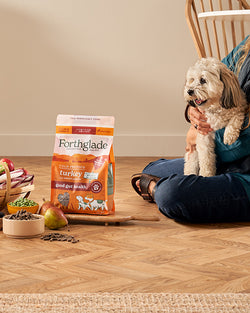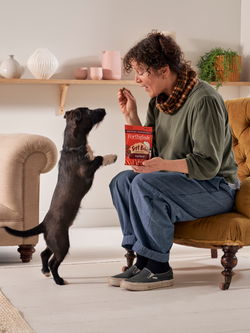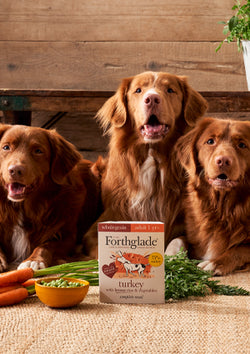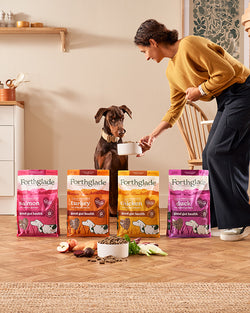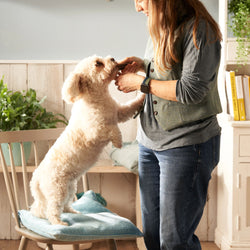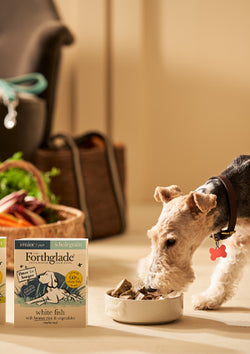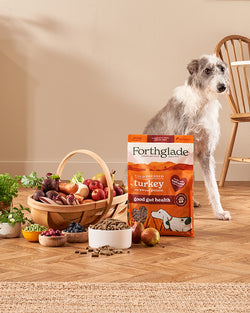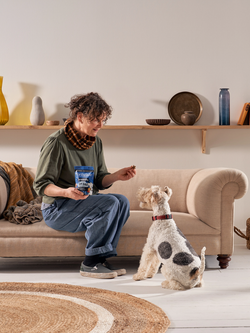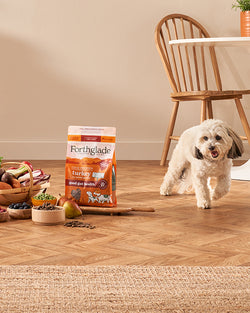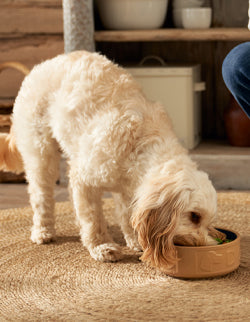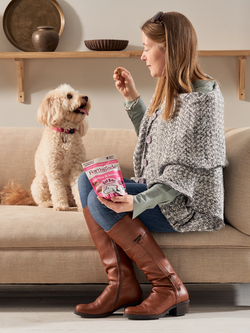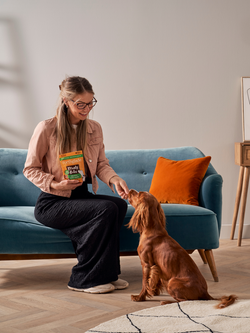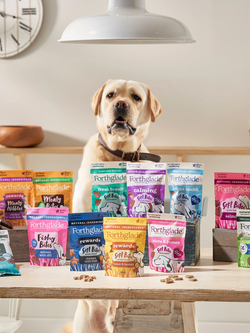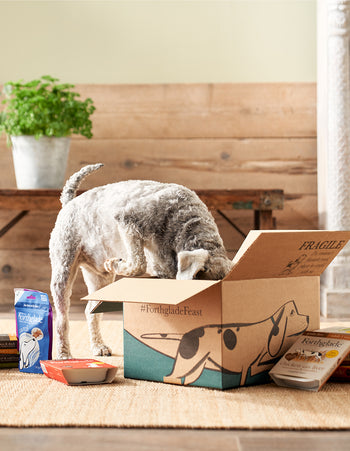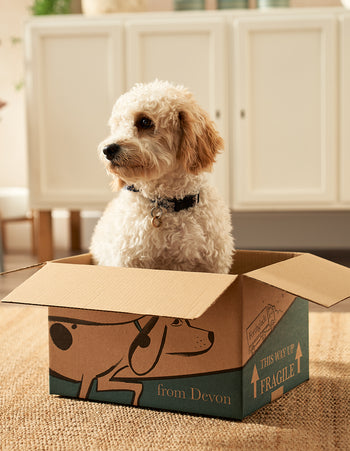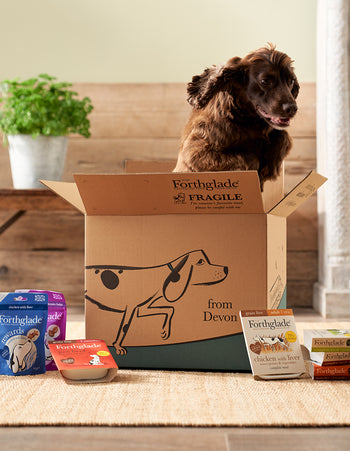Barking is a very normal way for puppies to communicate. But if your new pup is barking too often or for too long, it can feel frustrating, especially if you’re losing sleep over incessant barking or struggling to get daily tasks done at home.
Excessive barking is a very common behavioural problem, especially when they’ve been brought into a new environment, which many new dog owners experience. The good news is, it can be trained! Here, you’ll find out the reasons why a puppy barks and discover our 7 top tips on how to stop a puppy from barking so your household can feel peaceful again.

When do Puppies Start Barking?
Puppies typically find their voice and discover their bark around 8 weeks old, when they start bonding with humans and learn the best ways to communicate with them. While the barking stage is very normal and can initially be entertaining as you watch them make this discovery, it’s around this time that training should start to come in. By training early, they’ll begin to learn boundaries and which behaviours are acceptable and unacceptable, so you can nip excessive barking in the bud.
Why do Puppies Bark?
Before tackling the barking problem, it’s important to understand the reasons why puppies bark. This will help you to create an effective training plan, taking into account what your puppy is trying to communicate. Certain breeds are known for barking more than others, such as Beagles, Dachshunds, German Shepard's and Chihuahuas, but all puppies will bark and howl for many reasons, including:
- To get your attention
- When they’re bored
- Separation anxiety
- When someone is at the door
- When another dog or cat has been spotted
- When people walk past the house
- If a loud, unfamiliar noise is heard, such as fireworks, car alarms, construction works, etc
Puppies will also often bark when they are playing. However, this is needed for healthy brain development.

7 Tips on How to Stop a Puppy Barking
Once you’ve learned why or what your puppy is barking at, training will become a smoother process. However, if you’re still struggling to understand why your puppy is barking and the below advice doesn’t help, it may be best to take them to a trained behaviourist to help both you and your dog.
1. Don’t Tell Your Puppy Off
When you begin training, one of the most important things to remember is never to yell at or scold your dog. This could make them anxious, create fear and cause them to be confused by you. Some, more naturally confident puppies, may even join in and bark at you while you shout, creating more noise. Instead, reward-based training using delicious puppy treats offers the most effective and humane form of dog training.
2. Add more Toys and Playtime to your Puppy’s Life
If you’ve established that your puppy is barking because they’re bored, you’ll need to look at their daily routine and make adjustments where necessary. Some dogs, like working dog breeds, will have more energy than others and require longer walks and more mental stimulation. Setting aside time for playing, upping their exercise and giving them puzzle treat toys or scent games during the day should help reduce the barking, keep them distracted, and sufficiently tire them out.

3. Avoid Things Your Puppy Finds Scary
If your puppy is barking at something they’re scared of, either remove or avoid the scary thing as much as possible. For example, if your puppy is barking at the doorbell, turn the sound off and re-introduce the noise later when they are feeling calm and in a safe space. Fearful dogs who can’t seem to conquer their fears may need extra support from a behaviourist.
4. Ignore Barking for Attention
New puppies will often bark for your attention, whether it’s to initiate play, beg for food or seek affection. Acknowledging the barking in either a positive or negative way will only reinforce the behaviour. Try to ignore the barking. You may find the puppy’s barking gets louder or lasts longer at first, but this is completely normal. Only when your puppy is calm can you reward and interact with them, so they learn that barking doesn’t get them what they want.
5. Keep your Puppy Active
Puppies are very active creatures with bundles of energy, so ensuring they get plenty of exercise and keeping their minds busy is crucial, especially when it comes to successful training in those first few months. Puppy training games are a great way to teach useful skills, bond with your puppy, and expend some of their energy. If the puppy is old enough and up to date with its vaccines, they can start going on walks, exploring the world and learning how to walk on a leash. Sniffing is also excellent exercise for dogs and provides both mental and physical stimulation.
6. Offer a Safe Space or Crate Train
If your puppy experiences separation anxiety and barks a lot while you’re out or at night, offering a safe, calm and quiet space can help to ease their worries. This can be either a room they’re comfortable in, such as the living room, spare bedroom or dining room, or a crate. In this space, ensure they have food, water, a bed and a favourite toy or two. It may also be worth leaving a used item of clothing so they can comfort themselves with your scent. Crate training your puppy and offering a safe space will allow them to feel safe and secure, which should then put a stop to the barking.
7. Listen to your Puppy
Lastly, always try to listen to your puppy and understand why they might be barking. Sometimes, they bark if they need to go outside or to alert you when someone is at the door. In this case, a bark or two is acceptable. It’s only when the barking is excessive that it becomes a problem. However, if you don’t want them to bark at all, if you are particularly sensitive to sounds or live somewhere where neighbours are very close by, you can train other ways to let you know what they need.

A puppy barking is a very normal part of their growth and development, and while sometimes it may be okay for them to bark, while they’re playing or if they’re trying to tell you something, it’s important to train them to ensure persistent barking doesn’t become an issue. If even after training, your puppy still barks excessively, it may be worth taking them to a behaviourist to support your training and assess if there are any other underlying concerns that the dog may need help with.
In order to aid a healthy and happy pup, the right diet can make a big difference. Check out our range of nutritious puppy food, perfectly formulated for your puppy’s needs.








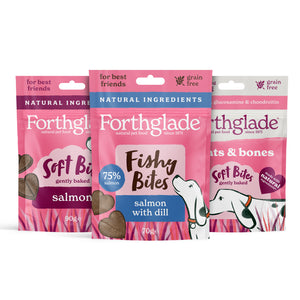



 FAST & FREE DELIVERY ON ORDERS £40+*
FAST & FREE DELIVERY ON ORDERS £40+*
 SUBSCRIBE TO SAVE 10% OFF EVERY ORDER
SUBSCRIBE TO SAVE 10% OFF EVERY ORDER
 OVER 13,600 5 STAR REVIEWS
OVER 13,600 5 STAR REVIEWS



